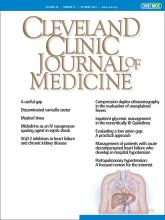To the Editor: Adults with attention deficit hyperactivity disorder (ADHD) experience sustained attention deficits manifested with accompanying difficulties completing tasks.1,2 While ADHD symptoms cause significant impairment, many affected adults remain untreated.1 Efforts to improve recognition and management include the development of ADHD symptom scales for screening and treatment monitoring of these patients.1
In the recent commentary by Drs. Manos and Short,2 task incompletion is regarded as the primary dysfunction in adults. Accordingly, the authors suggest that task completion should be used as a measure to track pharmacologic therapy response in these patients. This is conceptually plausible since several adult ADHD diagnostic criteria relate to task completion, eg, “reluctance to start or to persist with tasks requiring sustained mental effort.”3 Clinical assessments to help evaluate task completion difficulties include the use of continuous performance tests (CPTs), which can measure attention and require the individual to respond to targets (a measure of attention) and to inhibit response to non-targets (a measure of impulsivity).4
Marchetta et al5 found a deterioration of time-on-task in adults with ADHD relative to controls. Babajanyan et al3 noted 3 patterns that decreased task completion. These patterns included complete lapses in attention, partial attention to a task, and engaging in multiple tasks. However, disagreement exists on whether the ability to stay on task as measured by CPTs can accurately reflect the severity of ADHD. Baggio et al6 examined CPTs as a marker of adult ADHD presentation and severity and reported small correlations between CPT variables and ADHD symptoms determined by a clinical interview: 51.7% of the sample were classified as likely to have ADHD by CPTs. The classification error was 80.3% for the inattentive subtype and 22.5% for the hyperactive subtype.6
While the utility of CPTs to assess or monitor ADHD in adults appears limited, task completion itself may be a more suitable clinical measure. However, this remains to be empirically demonstrated in reliability and validity studies before it can be widely implemented in clinical settings.
- Copyright © 2023 The Cleveland Clinic Foundation. All Rights Reserved.






